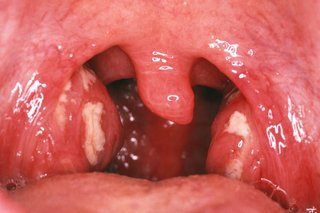Cryptic Tonsillitis


Cryptic tonsillitis can also occur in children. Here are some key points to consider regarding cryptic tonsillitis in children:
Symptoms: Children with cryptic tonsillitis may experience similar symptoms to adults, including bad breath, sore throat, difficulty swallowing, and the sensation of something stuck in the throat. However, young children may not be able to communicate these symptoms effectively, so parents should watch for signs of discomfort, refusal to eat, or excessive drooling.
Diagnosis: A healthcare professional, such as a pediatrician or an ENT (ear, nose, and throat) specialist, can diagnose cryptic tonsillitis in children through a physical examination of the throat and tonsils. They may use a tongue depressor or a specialized instrument to evaluate the tonsils and check for tonsil stones.
Treatment: Treatment options for cryptic tonsillitis in children are similar to those for adults. Mild cases may not require specific treatment and can be managed with good oral hygiene practices. Parents can encourage their child to gargle with warm saltwater (if the child is old enough to do so) and ensure they practice regular brushing and flossing. In more severe cases or if the tonsil stones cause significant symptoms or recurrent infections, the healthcare professional may recommend a tonsillectomy (surgical removal of the tonsils).
Comfort measures: In addition to following the healthcare professional's guidance, parents can help alleviate discomfort in their child by providing them with pain-relieving measures, such as offering over-the-counter pain medications appropriate for their age (as recommended by the healthcare professional), providing cool or warm fluids, and offering soft, soothing foods.
Communication with the healthcare professional: It's important for parents to communicate any concerns or changes in their child's symptoms to the healthcare professional. They can provide guidance on managing symptoms, monitor the child's condition, and determine if further treatment is necessary.
It's crucial to involve a healthcare professional specializing in pediatric care when dealing with cryptic tonsillitis in children. They can provide appropriate diagnosis, treatment recommendations, and ongoing support to ensure the child's health and well-being.
